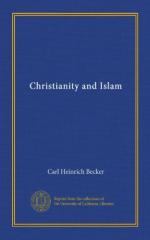The chief rival of Christianity was Judaism, which was represented in Northern as in Southern Arabia by strong colonies of Jews, who made proselytes, although their strict ritualism was uncongenial to the Arab temperament which preferred conversion to Christianity (naturally only as a matter of form). In addition to Jewish, Christian, and Old Semitic influences, Zoroastrian ideas and customs were also known in Arabia, as is likely enough in view of the proximity of the Persian empire.
These various elements aroused in Muhammed’s mind a vague idea of religion. His experience was that of the eighteenth-century theologians who suddenly observed that Christianity was but one of many very similar and intelligible religions, and thus inevitably conceived the idea of a pure and natural religious system fundamental to all others. Judaism and Christianity were the only religions which forced themselves upon Muhammed’s consciousness and with the general characteristics of which he was acquainted. He never read any part of the Old or New Testament: his references to Christianity show that his knowledge of the Bible was derived from hearsay and that his informants were not representative of the great religious sects: Muhammed’s account of Jesus and His work, as given in the Qoran, is based upon the apocryphal accretions which grew round the Christian doctrine.
When Muhammed proceeded to compare the great religions of the Old and New Testaments with the superficial pietism of his own compatriots, he was especially impressed with the seriousness of the Hebrews and Christians which contrasted strongly with the indifference of the heathen Arabs. The Arab was familiar with the conception of an almighty God, and this idea had not been obscured by the worship of trees, stones, fire and the heavenly bodies: but his reverence for this God was somewhat impersonal and he felt no instinct to approach Him, unless he had some hopes or fears to satisfy. The idea of a reckoning between man and God was alien to the Arab mind.




